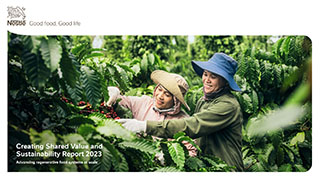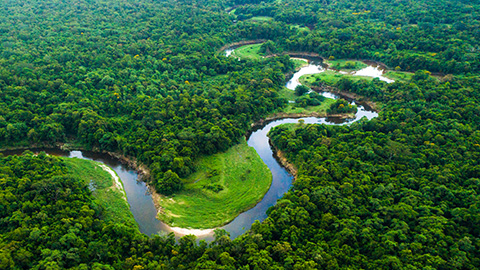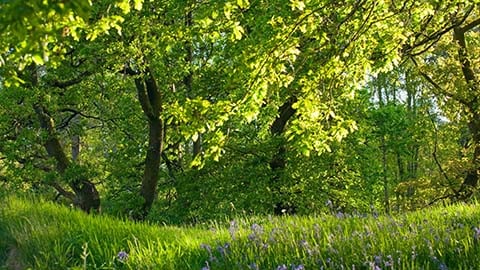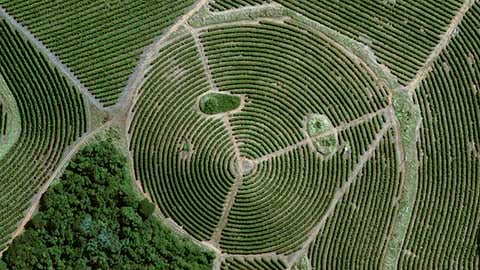Deforestation-free supply chains

The planet needs thriving forest landscapes. Working toward deforestation-free supply chains is a key component of our net-zero commitment.
Population growth and increasing demand for food mean natural ecosystems can be converted into farmland, even though trees and forests play a critical role in protecting biodiversity and limiting the effects of climate change.
But the past decade has shown us that seeking to address deforestation after it has occurred is not enough. It is essential that we continue to adopt responsible sourcing practices and promote the social benefits to farming communities located in and around forests. In that way, we can prevent additional habitat loss and make a positive impact on forests.
Over a decade of progress tackling deforestation
Aiming for deforestation-free by 2025
As part of our commitment to achieving deforestation-free supply chains, we avoid sourcing raw materials from:
- Areas converted from High Carbon Stock forests
- Areas converted from natural ecosystems such as wetlands or savannas
- Conversion of peatlands of any depth, except where farming practices protect peat
- International Union for Conservation of Nature protected areas categories I-IV
- UNESCO World Heritage Sites and wetlands on the Ramsar List
By the end of 2023, 93.4% of our primary supply chains for coffee, cocoa, meat, palm oil, pulp and paper, soy and sugar were assessed as deforestation-free, according to Nestlé’s standards. The decrease from 99.1% in 2022 is due to the new inclusion of coffee and cocoa in this indicator, where we have been assessing deforestation risks for less time. We remain committed to working towards achieving and maintaining 100% assessed deforestation-free in our primary supply chains for meat, palm oil, pulp and paper, soy and sugar, and for cocoa and coffee by 2025.
Working to assess risks and tackle their root causes
We take a risk-based approach to implementing the actions on which our commitment is based.
We start by mapping our supply chains to identify the origins of our raw materials. We then take steps to assess that our sourcing is preventing the risk of deforestation. Raw materials are confirmed as deforestation-free when either they can be traced to low-risk origins or have been assessed as deforestation-free either from the sky or from the ground.
Today, we can trace the majority of our supplies to origin and thanks to better data and monitoring, we are equipped to respond more effectively to deforestation alerts in our supply chains.
We are using the following tools to continue our work towards 100% deforestation-free supply chains:
2. Desktop-based risk assessment
3. On-the-ground assessment
4. Satellite monitoring
2. Landscape projects
3. Smallholder farmer initiatives
4. Industry collaboration
Our progress toward deforestation-free primary supply chains
We assess the deforestation-free status of key ingredients in the following ways:
Traceable to low-risk origin = Volumes are traced back to regions classified as at low risk of deforestation, using tools such as Maplecroft. The traceability exercise is carried out in collaboration with our partners (e.g., Earthworm Foundation and Proforest) or using technology.
Assessed on the ground = Volumes are assessed through on-the-ground assessments, including by High Carbon Stock Approach and High Conservation Value assessments, by our partners (e.g., Earthworm Foundation, Proforest and SGS) and/or through certification such as Roundtable on Responsible Soy and Proterra (soy), Forestry and Stewardship Council and PEFC (paper) and Roundtable on Sustainable Palm Oil. Only segregated volumes are accepted as deforestation-free.
Assessed from the sky = Volumes are assessed through satellite monitoring of production sites (farms, mills or supply areas) in our supply chain identified through a traceability exercise.
Unknown = Not traced or being traced, but not yet deforestation-free.
Deforestation-free in our primary supply chains
Unknown
Assessed from the sky
Assessed on the ground
Traceable to non-very-high-risk origins
93.4%
of primary supply chain assessed as deforestation-free*
5185.2 kilotonnes
(2023)
Coffee deforestation-free status
Unknown
Assessed from the sky
Assessed on the ground
Traceable to non-very-high-risk origins
92.8%
of primary supply chain assessed as deforestation-free
849.1 kilotonnes
(2023)
Cocoa deforestation-free status
Unknown
Assessed from the sky
Assessed on the ground
Traceable to non-very-high-risk origins
42.3%
of primary supply chain assessed as deforestation-free
337.4 kilotonnes
(2023)
Palm oil deforestation-free status
Unknown
Assessed from the sky
Assessed on the ground
Traceable to non-very-high-risk origins
96.0%
of primary supply chain assessed as deforestation-free
458.7 kilotonnes
(2023)
Sugar deforestation-free status
Unknown
Assessed from the sky
Assessed on the ground
Traceable to non-very-high-risk origins
98.1%
of primary supply chain assessed as deforestation-free
1650.7 kilotonnes
(2023)
Soy deforestation-free status
Unknown
Assessed from the sky
Assessed on the ground
Traceable to non-very-high-risk origins
97.9%
of primary supply chain assessed as deforestation-free
614.1 kilotonnes
(2023)
Pulp and paper deforestation-free status
Unknown
Assessed from the sky
Assessed on the ground
Traceable to non-very-high-risk origins
98.2%
of primary supply chain assessed as deforestation-free
1252.9 kilotonnes
(2023)
Meat deforestation-free status
Unknown
Assessed from the sky
Assessed on the ground
Traceable to non-very-high-risk origins
99.9%
of primary supply chain assessed as deforestation-free
22.2 kilotonnes
(2023)
Nestlé was one of the first companies to make a commitment to deforestation-free supply chains. At the time we knew it would be challenging, but we felt it was the right thing to do - for our environment, for the people, and for our planet at large.










